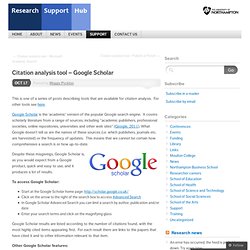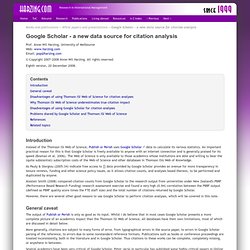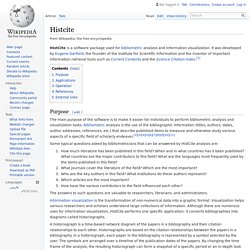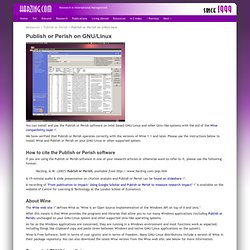Zoom
Trash

Citation analysis tool – Google Scholar. This is one of a series of posts describing tools that are available for citation analysis.

For other tools see here. Google Scholar is the ‘academic’ version of the popular Google search engine. It covers scholarly literature from a range of sources, including “academic publishers, professional societies, online repositories, universities and other web sites” (Google, 2011). What Google doesn’t tell us are the names of these sources (i.e. which publishers, journals etc. are harvested) or the frequency of updates.
This means that we cannot be certain how comprehensive a search is or how up-to-date. Despite these misgivings, Google Scholar is, as you would expect from a Google product, quick and easy to use, and it produces a lot of results. To access Google Scholar: Google Scholar results are listed according to the number of citations found, with the most highly cited items appearing first. Scholarometer: Browser Extension and Web Service for Academic Impact Analysis. Google Scholar - a new data source for citation analysis. Prof.

Anne-Wil Harzing, University of Melbourne Web: www.harzing.com Email: pop@harzing.com © Copyright 2007-2008 Anne-Wil Harzing. All rights reserved. Eighth version, 20 December 2008. Introduction Instead of the Thomson ISI Web of Science, Publish or Perish uses Google Scholar data to calculate its various statistics. As Pauly & Stergiou (2005:34) indicate free access to [ ] data provided by Google Scholar provides an avenue for more transparency in tenure reviews, funding and other science policy issues, as it allows citation counts, and analyses based thereon, to be performed and duplicated by anyone.
Alastair Smith (2008) compared citation counts from Google Scholar to the research output from universities under New Zealand's PBRF (Performance Based Research Funding) research assessment exercise and found a very high (0.94) correlation between the PBRF output (defined as PBRF quality score times the FTE staff size) and the total number of citations returned by Google Scholar. Zotero Scholar Citations. Histcite. HistCite is a software package used for bibliometric analysis and information visualization.

It was developed by Eugene Garfield, the founder of the Institute for Scientific Information and the inventor of important information retrieval tools such as Current Contents and the Science Citation Index.[1] Purpose[edit] The main purpose of the software is to make it easier for individuals to perform bibliometric analysis and visualization tasks. Bibliometric analysis is the use of the bibliographic information (titles, authors, dates, author addresses, references, etc.) that describe published items to measure and otherwise study various aspects of a specific field of scholarly endeavor.[2][3][4][5][6][7][8][9][10][11] Some typical questions asked by bibliometricians that can be answered by HistCite analysis are: How much literature has been published in this field?
The answers to such questions are valuable to researchers, librarians, and administrators. Applications[edit] Operation[edit] Mapping Science - Places & Spaces: Mapping Science. Publish or Perish on GNU/Linux. You can install and use the Publish or Perish software on Intel-based GNU/Linux and other Unix-like systems with the aid of the Wine compatibility layer.

We have verified that Publish or Perish operates correctly with the versions of Wine 1.1 and later. Please use the instructions below to install Wine and Publish or Perish on your GNU/Linux or other supported system. How to cite the Publish or Perish software If you are using the Publish or Perish software in one of your research articles or otherwise want to refer to it, please use the following format: Harzing, A.W. (2007) Publish or Perish, available from A 15-minute audio & slide presentation on citation analysis and Publish or Perish can be found on slideshare.
A recording of "From publication to impact: Using Google Scholar and Publish or Perish to measure research impact" is available on the website of Centre for Learning & Technology at the London School of Economics. About Wine Supported GNU/Linux distros Other Unix-like systems 1. 2. Forums - Zotero and Citation Analysis.